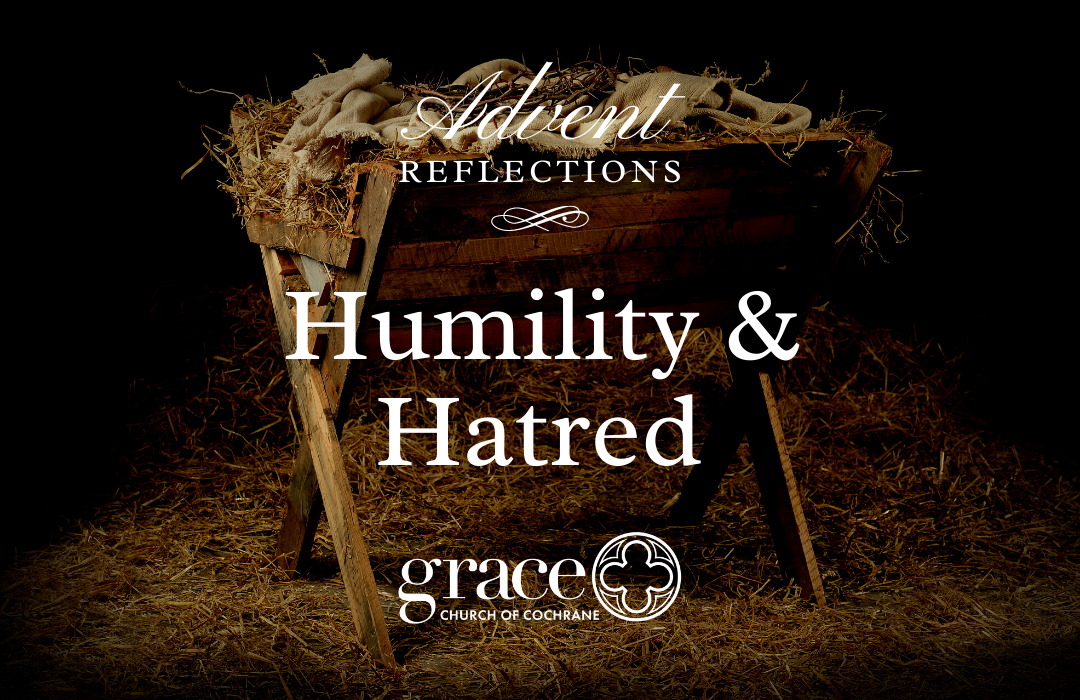Humility & Hatred

One of the enduring mental images I have from my years sitting under the preaching of Clint Humfrey, lead pastor at our mother church and former cattle rancher, has to be his use of the term “feed bunk” when he refers to the place where Mary’s baby lay. For me, it really drills in the reality of our Lord’s first resting place. I may be one of those Christians who has been thoroughly and irreversibly desensitized to that reality by our Christianese use of the term “manger.” That word has unfortunately been scrubbed clean of its real import by years and years of squeaky-clean nativity scenes, with their sanitary straw and crisp white linen swaddling. One of the blessings of having had, for a pastor, a man who dealt every day in the grimy, sweaty reality of animal husbandry was to benefit from his knack for bringing that reality home in a fresh way.
It was after one such sermon several years back, where he drilled in the reality of the “contaminated feed bunk” and the “contaminated straw” and the “contaminated stable” with its “contaminated animals,” that I took some time to put some thoughts on paper about the humility our Savior displayed in his incarnation—the thoughts I’ve shared below.
Because that’s what the Incarnation is: a demonstration of humility. Paul puts it best in Philippians 2: “Have this mind among yourselves, which is yours in Christ Jesus, who, though he was in the form of God, did not count equality with God a thing to be grasped, but made himself nothing, taking the form of a servant, being born in the likeness of men.” Although he goes on to describe the humiliation of the crucifixion, inherent in Paul’s argument here is the fact that for God the Son, leaving his glory on high to take on the “likeness of men” is a humiliation. To be a man meant that the Master of all took on the “form of a servant”; it meant that the God of all power “made himself nothing” rather than stubbornly cling to the equality with the Father that is his very nature and possession and right. Jesus Christ is more than a baby in the feed bunk, for sure. But he is not less, and that picture of his humility only enhances his glory.
Would that we would each embrace humiliation so willingly in our own lives, especially considering how infinitely smaller any earthly humiliation we experience is in comparison to the Son’s, and point the glory to the Father instead!
But why? There’s another dimension to the Incarnation. It was not only an act of humiliation. It was an act of hatred.
That may seem shocking to read. Hatred isn’t a word that mixes well with Christmas, is it? Just bear with me, however, and think of it this way: who are you missing this Christmas? What loved one didn’t live to see this Christmas? What unborn child never saw the light of day and the lights of this day in particular? What friend or family member do you know who is fighting their final battle with cancer or another terminal illness? And – why do these tragedies happen? They aren’t cosmic accidents, not in our world with its Sovereign God. They are the result of sin. Sin took those people from us.
The pain of thinking of these losses gives us just a tiny glimpse of how serious sin is. We need to fasten on the sobering nature of sin. After all, God most certainly does. Sin is abhorrent, loathsome to him. The greatest pain and loss you’ve ever felt can’t come remotely close to the offence that sin has caused to the Lord of Hosts. God hates sin with every righteous fibre of his immeasurable being. And nothing, nothing at all, demonstrates that holy and righteous hatred more clearly than the staggering length to which he went to destroy it. That hatred of sin motivated God to undergo the humiliation of the Incarnation – and the even greater humiliation that followed thirty-odd years later at Calvary.
Christmas is often bittersweet. Now, it’s not always due to loss or conflict. Often the hurt of the holidats is simply the pain that arises from the imperfection of life in a fallen world. And so sometimes it’s thoughtless family members, or the inability to provide for family due to injury. Or sometimes it’s the distance between loved ones who have, in God’s providence and with God’s blessings, settled in places separated by thousands of miles—and the pain of separation arises directly from the fact that our lives are limited and time is short. After all, would we experience the same kind of pain in the midst of separation if no one ever died? Would we feel the frustration of failing bodies if there were no disease and no possibility of injury? And so sadness and pain, whatever its earthly, instrumental cause, has a purpose. Sin has a sting that goes deep and whose venom spreads to touch every aspect of life, and so we need to condition ourselves to respond as our Lord did: with hatred. Not hatred for those who, like we ourselves as unfinished and imperfect Christians, commit sin. Rather, we are to hate the sinful condition that has caused the hurt and pain we see all around us and feel inside us. Hate it enough to respond with the healing salve of the Gospel – to your own pain, and to the pain of others. Christ’s birth was good news for that reason.
More in Blog
August 15, 2022
Registration is LIVE for our "Zoomerang" VBS August 15-19!June 14, 2022
Means of Grace for June 14: God's Nature, Spurgeon's Evangelist, Culture War, Tradition & More!March 16, 2022
Preparing for One's Baptism Service